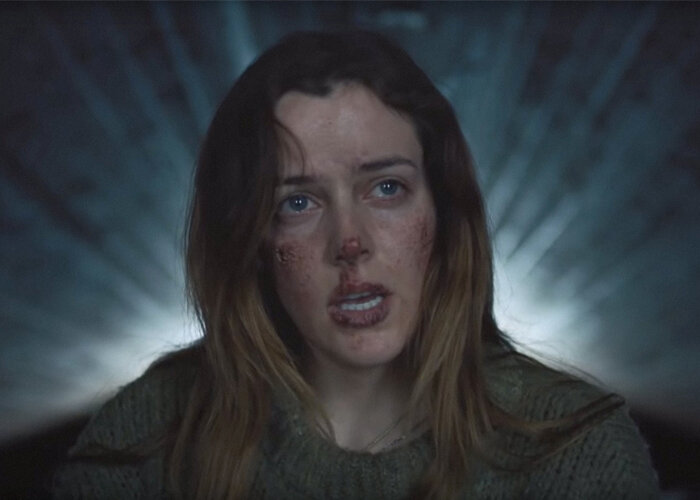Film Review: The Lodge
The Kids Are Not Alright
A one-way road trip to atmospheric terror, Veronica Franz and Severin Fiala’s The Lodge is a timely exploration of isolation, guilt, and trauma. Anchored by a powerful and nerve-fraying performance by Riley Keough, the film serves up a wintry mix of slow-burn cult horror. While light on true scares, The Lodge more than makes up for it with its searing imagery and shocking acts of violence, even if its rushed third act deflates the film’s carefully constructed narrative. Minor spoilers ahead…
At first glance and in broad strokes, The Lodge shares the same twisted DNA as Ari Aster’s 2018 demonic possession shocker, Hereditary. With its harrowing inciting trauma, prolonged depictions of soul-crushing grief, and even a dollhouse-tinged leitmotif, directors Veronica Franz and Severin Fiala’s new film seemingly plays many of the same arthouse notes as A24’s horror hit. But just like the duo’s previous feature length terrifier, Goodnight Mommy, The Lodge relies much more on atmosphere and the lingering specter of trauma. Aided by an arresting performance Riley Keough and the creeping cinematography of Thimios Bakatakis, the film is essentially a bottle episode in cinematic horror form, utilizing its icy, claustrophobic setting to great, unnerving effect.
The Lodge follows the Hall family in the throes of upheaval, revolving around two children - Aidan (Jaeden Martell, It, Knives Out) and Mia (Lia McHugh, Totem) - as they grapple with their father Richard’s new fiancé, Grace (Riley Keough, American Honey, Logan Lucky). A frosty relationship within a powder keg of resentment, the kids disdain for their father’s (Richard Armitage) new bride-to-be extends way beyond your run-of-the-mill reluctance to accept a new step-parent; instead, it’s borne from an unspeakably violent tragedy that shatters their family. Adding further complications is Grace’s fragile mental state, stemming from the fact that her father was the leader of a Christian death cult whose entire congregation committed suicide when she was a child, leaving her as the only survivor.
“
While light on true scares, The Lodge more than makes up for it with its searing imagery and shocking acts of violence, even if its rushed third act deflates the film’s carefully constructed narrative.”
At its core, the crux of The Lodge lies in the hands of one really shitty father: In an attempt to hurry along the fractured relationship between Grace and his kids, Richard arranges for a Christmastime getaway to the titular lodge, only to abandon them for work back in the city. Aidan and Mia’s contempt for their new charge, along with Grace’s precarious mental state, make for dangerous bedfellows, made even worse when strange things begin to occur within their isolated abode. With a nasty winter storm, disappearing items, and power outages, the question then becomes: Is there something sinister lurking within the walls of their arctic getaway? To say more would give away the The Lodge’s fairly obvious secret, one telegraphed so heavily that calling it a “twist” would be somewhat of a misnomer.
The Lodge deftly works as a maelstrom of parallel themes, exploring the unshakable bonds of family (in more ways than one) and the concepts of guilt as well as the trauma of surviving trauma. Riley Keough, in particular, puts forth a disturbingly affecting performance, portraying her slow untethering from reality as a simmering nightmare. Even the children, played by Jaeden Martell and Lia McHugh, extrapolate themselves beyond their inherent unlikeability with performances that effectively mix vicious cruelty with layered sympathy. All of this is further buoyed by the atmospheric compositions of cinematographer Thimios Bakatakis, a frequent collaborator with director Yorgos Lanthimos, who cut his teeth on films such as Dogtooth, The Lobster, and The Killing of a Sacred Deer. Utilizing a dank color palette along with eerie symmetries, Bakatakis commands the film’s mostly singular location, mining dread from darkness, negative space, and haunting images of religious iconography. The Lodge is the one of the rare winter-bound films in which you can actually feel the subzero chill of its energy.
In the end, however, The Lodge suffers from a rushed collapse of its carefully built narrative, having its delicate balance thrown out a little too quickly to be thematically satisfying. The film’s big “twist” is anything but, which is refreshingly not a problem, but the way it unfolds is, at its best haphazard, and at its worst, perfunctory. The movie’s big gotcha moment is a little too matter-of-fact to elicit more than a shrug, but it can also be forgiven once its narrative shifts from atmospheric creep to outright hysteria. The Lodge’s ending is a doozy: an explosive flurry of fucked-up violence and a thoroughly unsettling terminus that drives home the fact that Keough is one to watch.












